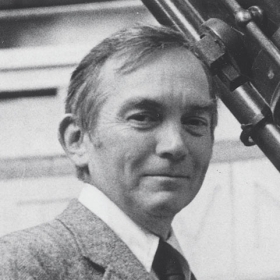1926–2021
D. Scott Birney died on Aug. 15, 2021, at age 95. Scott joined the astronomy department in 1968, and throughout his 23 years at the College, his good cheer, wry wit, and self-effacing demeanor made the Whitin Observatory a congenial and supportive home to both students and faculty.

D. Scott Birney died peacefully in his sleep on Aug. 15, 2021, at age 95. Scott joined the legendary Miss Sally Hill in the astronomy department in 1968, and throughout his 23 years at the College, his good cheer, wry wit, and self-effacing demeanor made the Whitin Observatory a congenial and supportive home to both students and faculty.
Scott introduced the wonders of the night sky to hundreds of introductory astronomy students, teaching them the constellations and sharing the magnificent views of the moon, planets, stars, and galaxies visible through the historic telescopes of the observatory. His courses were meticulously prepared and constantly revised to bring in the latest astronomical discoveries and techniques. He wrote a popular introductory textbook, followed later by a text on astronomical techniques, both based on his teaching experience at Wellesley.
Shortly after Scott’s arrival at Wellesley, Margaret Sawyer’s generous gift of a research-grade 24-inch telescope transformed the opportunities for hands-on astronomical research by advanced students. Scott developed upper-level courses and instrumentation for the new telescope, while overseeing the restoration of the historic 12-inch refractor, stripping the battleship-gray paint to reveal the original beautiful wooden telescope still used today on clear nights by introductory students.
During his many years as director of the observatory and department chair, Scott encouraged his more junior faculty members to take risks and to try new things, even if not every experiment worked. I remember the deep anxiety I felt in my own early days at the College when I reluctantly reported to Scott that our expensive attempt to build a spectrograph for the 24-inch telescope was fatally flawed. He laughed it off in his gentle way and told me to get started on my next big idea.
That was his gift to his many students as well—the freedom to try, the forgiveness of failure, and the encouragement to try again. As one of them wrote: “He applied skillful means to nurture those around him by providing the right conditions for us to flourish. Even if that was not always in the moment, or instantaneous, as we wrongly expected of ourselves.”
She went on to say: “That is a wonderful legacy extended to so many students, who like that astonishing giant gardenia in his office, benefited so much, over a lifetime of taking an interest in us, as we went on to sprout new skills and open up to new interests. What a savvy gardener of people, and a wise, observant, and much-loved human being.”
Amen!